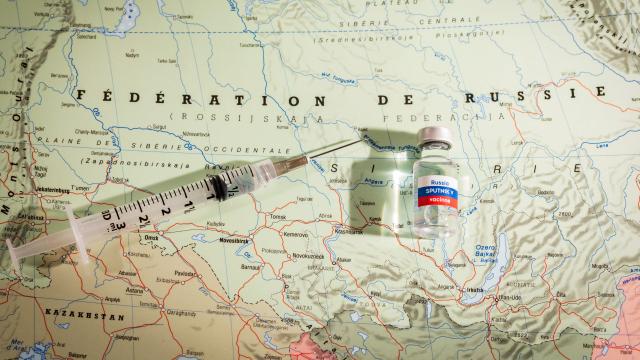Since the beginning of the COVID-19 pandemic, much of the optimism that “we’ll get through this” and be “back to normal” sometime soon has been pinned to the development and approval of an effective vaccine against the novel coronavirus. Major pharmaceutical companies like Pfizer and Moderna have been conducting clinical trials for multiple formulations of COVID vaccines at testing sites across the globe for several months now. And while some Phase 3 trials are underway, and we’re getting closer, there’s still a lot of work to be done before a COVID vaccine is proven to be safe and effective, let alone made publicly available.
Meanwhile, in Russia, President Vladimir Putin announced yesterday that they have the world’s first approved* COVID-19 vaccine. In a segment on Russian state TV that wouldn’t have sounded out of place in a late 19th century travelling medicine show, Putin noted that he is so confident in the vaccine that his own daughter has gotten it. Needless to say, we have a lot of questions about this vaccine and its development. Here’s some of what we know — and don’t know — about it so far.
(*by Russia)
The research process was seriously flawed
In the early days of vaccine development in the 19th century, it wasn’t uncommon for scientists to first test a vaccine’s safety and efficacy on themselves before trying them out on others. By the mid-20th century, some medical testing — including that for for vaccines — routinely took place using institutionalized individuals (people in prisons, psychiatric facilities and orphanages, among others) as non-consenting research subjects, many of them people of colour.
Fortunately, we now have a better system in place. As Rachel Fairbank explained in an article on this site back in April, the United States has standardised a multi-step testing process to ensure that any vaccine that will go out to millions of people actually works, and doesn’t cause serious harm.
Potential vaccines are tested on human volunteers in these three phases:
- Phase 1: Testing various dosages and looking for side effects.
- Phase 2: The optimal dose from Phase 1 is given to a larger group of human volunteers in a therapeutic dose (the dose you’d need for an average patient) to determine if it’s safe and effective.
- Phase 3: Testing is done on a much larger scale to get a better idea of what the range of immune responses will look like across the general population.
Turns out, Russia didn’t feel like it needed to do Phase 3 trials, so this new vaccine was approved without that crucial stage of testing. Among scientists’ many (many) concerns is the very real possibility that receiving a faulty vaccine could potentially make people even more vulnerable to severe forms of COVID-19, The Scientists reports. And the only way to eliminate this serious possibility, is to — you guessed it — do further clinical trials with larger numbers of participants. Which Russia has opted not to do.
There are no publicly available data on the outcomes of these trials
So far, Russian authorities haven’t released any data on the clinical trials that they actually did conduct, so we have no evidence that the vaccine is in any way effective, or whether there were any serious side effects. Not only is this bad science; there is the potential to do more harm than good if unproven vaccines are administered to the public.
We do know a little bit about the vaccine itself. As the New York Times reports, it “uses two strains of adenovirus that typically cause mild colds in humans. Scientists genetically modified them to cause infected cells to make proteins from the spike of the new coronavirus, officials have said.” If this sounds familiar, it’s because it’s similar to the approach of a vaccine being developed by Oxford University and AstraZeneca that is currently undergoing Phase 3 trials in Britain, Brazil and South Africa.
But the only information we have so far on the outcomes of the preliminary trials of this Russian vaccine comes from the country’s health minister, Mikhail Murashko, who, per the New York Times, has described the vaccine as safe and effective, noting that “All volunteers developed high [tiers] of antibodies to COVID-19, while none of them showed serious complications of immunization.” Putin also chimed in with an update on how his daughter fared, noting that she had a slightly higher temperature after each dose, but that “now she feels well.” So there you have it.
Of course it’s political
The “race for the vaccine” is the most recent event in the ongoing dick-measuring decathlon between Putin and Donald Trump, who launched his own program to try to get science to hurry the hell up — called “Operation Warp Speed” — in May. Obviously, we all want a safe and effective vaccine as soon as possible, but Russia openly acknowledging that they skipped a critical phase of clinical trials doesn’t bode well.
If this all feels a little Cold War — specifically, reminiscent of the mid-century Space Race between the USSR and the United States — that’s not a coincidence. For evidence, look no further than the name the Russian vaccine will go by in foreign markets: “Sputnik V”. Yes, as in the world’s first man-made satellite, which was blasted into orbit by the USSR in 1957, beating the United States to that particular scientific milestone. Except in this case, instead of a satellite, they’re launching a potentially harmful vaccine that could make a global pandemic even worse.

Leave a Reply
You must be logged in to post a comment.